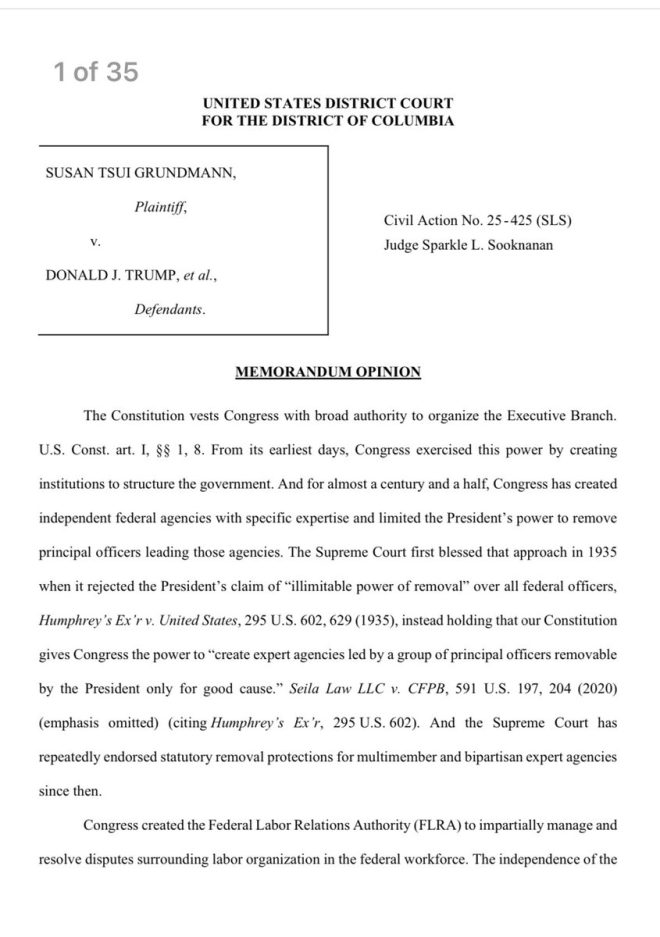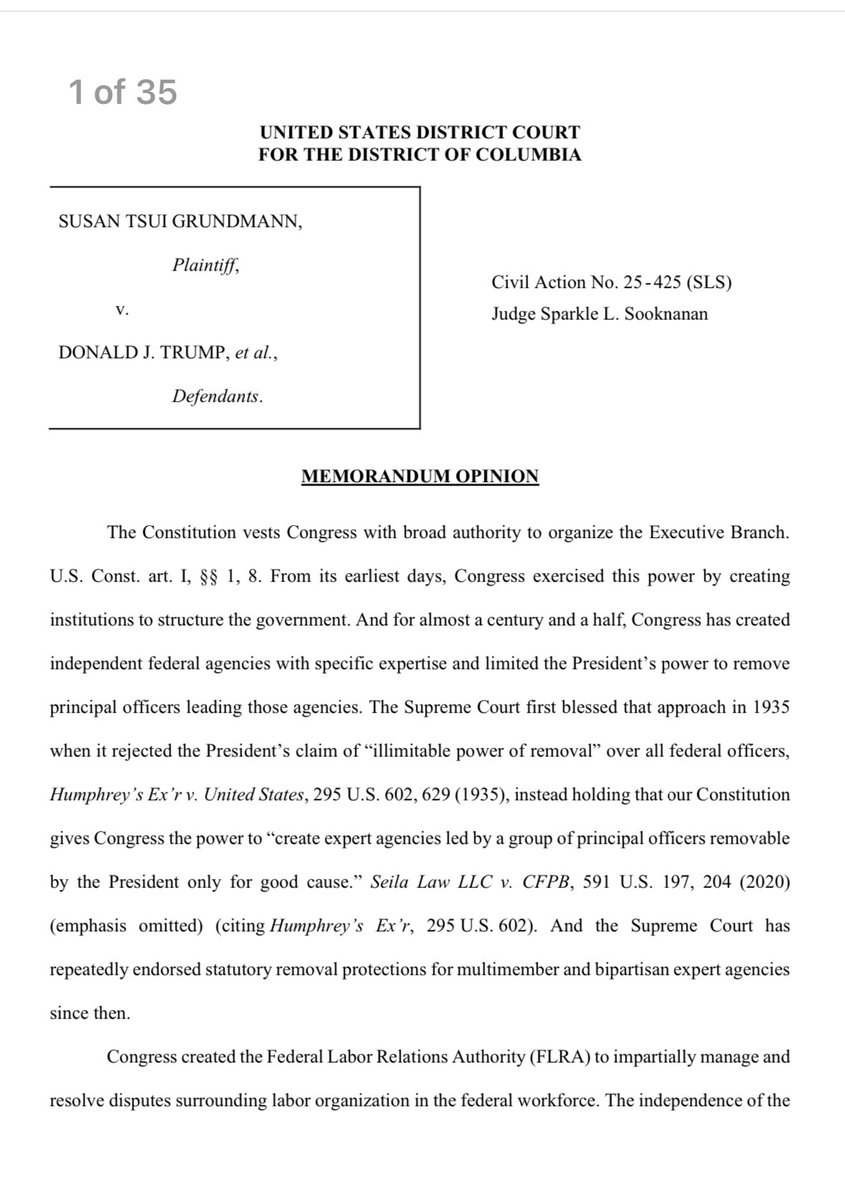
Breaking News: Federal Judge Rules Against Trump’s Authority Over Independent Boards
In a significant legal development, a federal judge has ruled that former President Donald Trump’s firing of a member of the board responsible for handling federal employee labor disputes was unlawful. This ruling marks an important moment in the ongoing legal battles surrounding Trump’s claims of absolute power over independent boards, a situation that is likely to escalate to the Supreme Court of the United States (SCOTUS).
Context of the Case
The board in question plays a critical role in addressing and adjudicating labor disputes involving federal employees. It operates independently from the executive branch, which is designed to ensure fair labor practices and protect employees’ rights. Trump’s administration had previously attempted to exert control over this board, leading to the dismissal of a board member whose removal was deemed unlawful by the federal judge. This decision highlights the ongoing tensions between the executive branch and independent agencies, a recurring theme in the legal landscape of recent years.
Implications of the Ruling
This ruling has several implications, both legally and politically. First and foremost, it reinforces the principle of independence for boards that oversee labor relations and other critical functions of government. The judge’s decision is a reminder that no president has the unilateral authority to dismantle or manipulate independent agencies at will.
Furthermore, this case reflects broader concerns about executive overreach and the balance of power within the U.S. government. Trump’s assertion of total power over independent boards has been a contentious issue, and this ruling serves as a counterbalance to those claims, emphasizing the importance of checks and balances.
- YOU MAY ALSO LIKE TO WATCH THIS TRENDING STORY ON YOUTUBE. Waverly Hills Hospital's Horror Story: The Most Haunted Room 502
The Road to SCOTUS
Given the high stakes involved, it is anticipated that Trump’s legal team will appeal the ruling, potentially bringing the case before the Supreme Court. The outcome of such a case could have far-reaching consequences for the authority of future presidents and the operational independence of federal boards and agencies.
The Supreme Court’s decision could set a precedent regarding the limits of executive power, particularly in terms of appointing and removing members of independent boards. The case could also influence how future administrations interact with independent agencies and manage labor relations at the federal level.
Public and Political Reaction
The ruling has sparked a variety of reactions across the political spectrum. Supporters of the decision argue that it is a necessary affirmation of the rule of law and a vital protection for federal employees’ rights. Critics, however, may view it as an obstruction to the president’s ability to govern effectively.
Public opinion on the matter is likely to be divided, reflecting the polarized nature of contemporary American politics. As the case progresses, it may galvanize both supporters and opponents of Trump’s policies, potentially impacting future elections and the political landscape.
Conclusion
The recent ruling against Trump’s dismissal of a board member responsible for federal employee labor disputes is a landmark decision that underscores the importance of independent agencies in the U.S. government. As this case heads toward the Supreme Court, it will undoubtedly draw significant attention and could reshape the understanding of executive power for years to come.
This situation serves as a critical reminder of the complexities of governance and the enduring nature of checks and balances within the American political system. As legal battles continue, the implications for federal employees, labor relations, and executive authority will remain at the forefront of national discourse.
For more updates on this developing story, stay tuned as we follow the case through its trajectory toward the Supreme Court.

BREAKING: A federal judge has ruled that Trump’s firing of a member of the board that handles federal employee labor disputes was unlawful, the latest rejection of his claim to have total power to remake independent boards — likely headed for SCOTUS. https://t.co/iLVdXooV3a pic.twitter.com/XVCs3k0PkX
— Kyle Cheney (@kyledcheney) March 12, 2025
BREAKING: A federal judge has ruled that Trump’s firing of a member of the board that handles federal employee labor disputes was unlawful
So, here’s the scoop. A federal judge recently decided that former President Donald Trump’s decision to fire a member of the board responsible for handling federal employee labor disputes was unlawful. This ruling is significant because it challenges Trump’s assertion of having the ultimate authority to reshape independent boards. It’s a pivotal moment that might just set the stage for a showdown at the Supreme Court, or SCOTUS, as we like to call it.
Why does this matter? Well, this kind of decision can have far-reaching implications for how independent boards operate and how federal employees are treated. Independent boards are vital for maintaining a balance between government interests and the rights of employees, and any attempts to undermine their integrity can lead to serious consequences.
Understanding the Role of Independent Boards
Independent boards play a crucial role in the federal government, particularly in labor disputes. They ensure that employee rights are protected and that there’s a fair process for addressing grievances. These boards are designed to operate without undue influence from political figures, which is why Trump’s actions raised so many eyebrows.
When a president or any political figure tries to exert control over these boards, it raises serious questions about the independence of the judicial process. The ruling against Trump underscores the importance of keeping these boards free from political maneuvering, which is essential for fostering trust in government institutions.
The Implications of the Ruling
This ruling is more than just a legal decision; it’s a significant rebuke of Trump’s broader claims about executive power. The judge essentially stated that firing a member of an independent board is not within the scope of presidential authority. This idea of “total power” is something that has been debated extensively, and this ruling could be a major piece in the puzzle of how we understand executive power in the United States.
Moreover, the implications of this ruling could ripple through the legal system. If this case indeed heads to the Supreme Court, it could set a precedent for how similar cases are handled in the future. It could either reinforce the notion of presidential power or, conversely, establish stricter limits on that power.
What Happens Next?
With the possibility of this case moving to the Supreme Court, all eyes will be on how this unfolds. Legal experts are already speculating about the various outcomes and their potential impacts on executive authority. Will the Supreme Court uphold the lower court’s decision, or will they side with Trump’s interpretation of his powers?
This will not only be a significant legal battle but also a political one. The outcome could influence the public’s perception of executive power and, by extension, the legitimacy of actions taken by future presidents.
The Political Landscape
Trump’s presidency was marked by a contentious relationship with various institutions, including the judiciary. This ruling could further polarize opinions about him and his administration. Supporters might view the decision as an overreach by the judiciary, while opponents might see it as a necessary check on presidential power.
As we navigate this complex political landscape, it’s essential to remember the broader implications of such rulings. They don’t just affect one individual; they shape the entire framework of governance in the United States.
Public Reaction and Media Coverage
The public reaction to this ruling has been mixed. Supporters of Trump have expressed outrage, arguing that this is an example of judicial overreach. On the other hand, many advocates for labor rights and federal employees see this as a victory for fair treatment and accountability in government.
Media coverage has been extensive, with outlets dissecting every angle of the ruling. From legal analyses to opinion pieces, the conversation surrounding this decision is vibrant and ongoing. The narrative is evolving, and it’s crucial to stay informed as new developments arise.
Why This Matters to You
You might be wondering, “Why should I care about this ruling?” The truth is, it’s not just a legal matter; it’s about the rights of federal employees and the integrity of our governmental institutions. The independence of boards that handle labor disputes affects millions of federal employees.
If you’re a federal employee, this ruling could impact your rights and protections in the workplace. It’s essential to understand the ramifications of such decisions and how they might influence your work environment and job security.
Future of Labor Relations in the Federal Government
Looking ahead, this ruling could mark a turning point in labor relations within the federal government. If the Supreme Court upholds the decision, it could reinforce the independence of boards and lead to more robust protections for federal employees. Conversely, a ruling in favor of Trump could signal a shift toward greater executive control over independent boards, potentially jeopardizing the rights of workers.
As labor relations continue to evolve, it’s imperative to keep an eye on how these cases unfold. Changes in the legal landscape can create a ripple effect, influencing policies and practices across the country.
Staying Informed
In a world where political and legal matters can feel overwhelming, it’s crucial to stay informed about significant rulings like this one. Engage with reputable news sources, follow legal commentators, and participate in discussions about the implications of such decisions.
Understanding the law and its impact on our lives is empowering. Whether you’re directly affected by these rulings or simply interested in the political landscape, staying informed is key to navigating these complex issues.
In summary, the recent ruling regarding Trump’s firing of a member of the board that handles federal employee labor disputes is a significant development. It raises important questions about executive power and the independence of federal boards, with potential implications for labor relations and employee rights in the future. As this case moves forward, it’s essential to stay engaged and informed about the evolving landscape of labor relations and governance in the United States.
